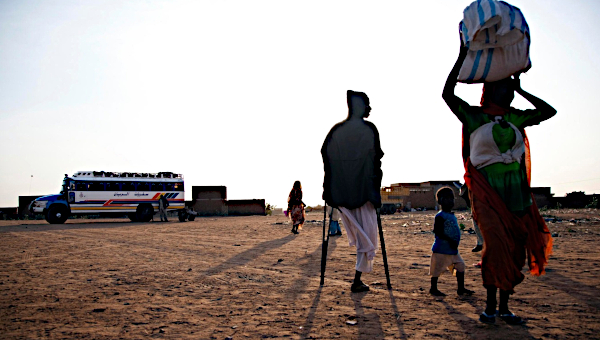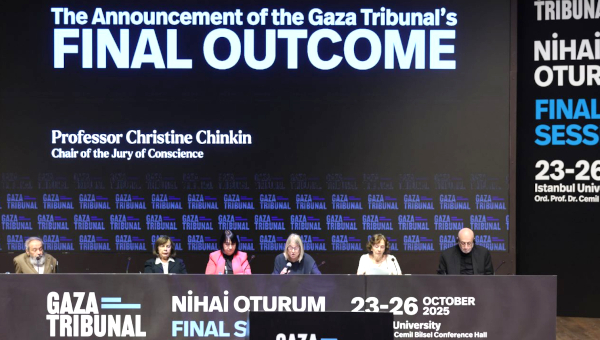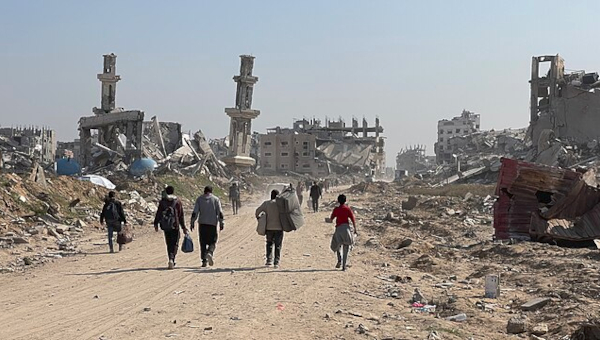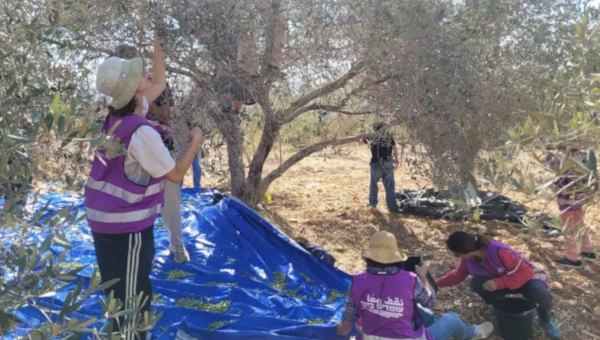Rania Khalek interviewed by Justin Podur
When journalist Rania Khalek’s lecture was cancelled on February 27, the group that invited her, Students for Justice in Palestine – University of North Carolina (SJP-UNC) issued a statement saying that the cancellation was because of Rania’s “views” on Syria, and that they believed “her invitation would mistakenly imply SJP to hold such views.” They also added that they “do not endorse nor reject her views on the Syrian civil war as they remain relatively unclear according to our members’ diverse opinions of Rania’s analyses.”
In response to the cancellation, a large number of signers, many of whom have been involved with Palestine solidarity, signed a statement against Rania’s blacklisting but also against blacklisting in general. That statement concluded:
“The signers of this statement hold a range of views on Syria. Some agree with Khalek; others disagree – in some cases quite vehemently. But we feel that when a group seeking justice in Palestine subjects speakers or members to a political litmus test related to their views on Syria, it inevitably leads to splits, silencing, confusion, and a serious erosion of trust. It runs contrary to the possibility of people learning from one another, changing their minds, and educating one another through their activism. Disagreements about political issues exist inside every movement coalition. They must not be made fodder for targeted vilification of activists in the movement.”
The statement “against blacklisting” triggered another wave of slanders, as many of the same people who had pressured the SJP to cancel her talk approached signers to argue that they should not have signed. Among their arguments was that there is and should be a political litmus test, one that Rania fails. As an initial signer myself, I was approached more than once by friends who suggested that I didn’t really know Rania’s views.
The people that have written about Rania publicly range from truly creepy stalkers to left academics who fired off a quick set of libels and then expressed dismay at the responses to them. But other than people talking about her, it is in fact rather difficult to find any sources for these “views” of hers that apparently disqualify her to speak or publish on any topic.
Out of concern that maybe I didn’t really know them, I sought Rania out to ask her about these much-maligned but rarely aired “views.”
Justin Podur is a Toronto-based writer who blogs at podur.org.
Justin Podur (JP): Are you an Assadist?
Rania Khalek (RK): I am not a fan of the Syrian government. I’m not out here to support the Syrian government.
What I oppose is the dismantling of the Syrian state which is what several powers have done in the past six years. I oppose that because we’ve seen what it looks like in Libya, Iraq, Afghanistan, Somalia, and I don’t want to see that happen to Syria.

JP: So, this is your first “view.” Based on your understanding of what happened after the removal of Gaddafi in Libya, Saddam in Iraq, and other countries, you oppose the destruction of the state, and based on your understanding of groups like Nusra and ISIS, you do not support the opposition to the Syrian government. The people who call you Assadist for this should also call people who opposed the war in Iraq Saddam-ist, the people who opposed the war in Libya Gaddafi-ist, etc.
RK: Exactly. And I think it is an unfair portrayal and an inaccurate binary because if you don’t support these Islamist rebel groups that have ultraconservative ambitions, that supposedly makes you a supporter of a dictator and that’s not fair.
I would love to see a democratic Syria. I would love to see a Syria where parties other than the Ba’ath could flourish and run in elections. The fact now is that there’s a right-wing, far-right insurgency funded by some of the biggest powers in the world trying to destroy the country. Under current conditions it’s impossible for people to demand and get reforms.
JP: Ah. Here too there is a genuine difference of opinion with supporters of the Syrian revolution who argue the opposite: that as long as Assad is in place, you can’t have reform.
RK: Right, but that should be a debatable point for political discussion. Why can’t we debate it?
JP: I agree. Your contention that reform is impossible while this rebellion continues and the contention that reform is impossible while the regime is in power are different assessments of the situation that it should be possible to discuss within the movement. My next question: Did you attend an Assad-sponsored public relations (PR) conference in Damascus?
RK: I was able to travel to Syria, was able to get my visa approval to Syria, by agreeing to attend a 2-day conference in Damascus hosted by a pro-government British NGO. I went there along with several prominent journalists from every mainstream outlet in the West: New York Times, Washington Post, NPR, BBC, LA Times, Telegraph, The Times (UK).
JP: I recently watched a PBS documentary from a few years ago, titled Inside Assad’s Syria. That journalist was on a regime-guided tour.
RK: That’s the only way to get into the government-controlled areas of Syria. It’s a police state. They only allow you to see certain things. You should have that in mind and keep that clear.
JP: It is often the case that if you’re a journalist reporting on any kind of conflict, the only way to get in is to go with one side or the other. It is one of the reasons it is so hard to get good information about conflicts and something Patrick Cockburn wrote about last year.
RK: All of these journalists agreed to go to this conference so they could go to the government areas, where the majority of people still remaining in the country live. If you want to talk to these people, you have to get a visa, which means you have to get the agreement of the government. Each individual paid their own way, stay, transportation. I wasn’t funded by the regime. I paid my own way. I didn’t even end up going to the conference. I decided not to go when I discovered that my name was included on the program even though I didn’t agree to speak (along with several others who hadn’t agreed to speak).
Mainstream journalists spoke at this conference, on more than one panel. None of them were smeared the way I was. It was a campaign to get me fired and it worked. Because of this smear against me, there has been a soft boycott of any of my reporting, which is the point.
Anybody who repeats that I “spoke at an Assad-sponsored PR conference in Syria,” may be misled or malicious, but either way they are participating in a process that tries to ensure none of my reporting gets any airtime.
JP: So, on this point: like every mainstream journalist working on Syria,
and alongside many of them, you traveled to government-controlled areas and attended government events with government permission.
My next question: Reuters, Al-Jazeera, and other outlets reported in December 2016 that rebels had poisoned the Damascus water supply. I remember you tweeted about it. And in March, a UN report looking at satellite photos and asking people there, said that it was the government bombing its own water supply. According to the New York Times in March 2017 “investigators said video of the bombings, witness testimony and satellite imagery showed the water supply system had been damaged in at least two airstrikes using high-explosive bombs,” and that the idea that the water facilities were damaged from the ground was “inconsistent with observable physical evidence.” What do you make of this?
RK: The rebels we were talking about in Wadi Barada were al-Nusra (al-Qaeda in Syria – they have changed their name again since but they are al-Qaeda). Wadi Barada is where the water supply for Damascus comes from. My own sources on the ground said that al-Qaeda affiliated rebels put diesel in the water. There was a water shortage, bad for everybody in Damascus including friends of mine who live there. The valley where this water is, was destroyed in some bombing. Both sides blamed each other, although there were pictures of rebels standing on top of the destroyed water infrastructure. You have claims from both sides and in this case it doesn’t make sense to me that the government would bomb its own water supply.
JP: Damascus is the capital, a government-held area. This one seems to me to be debatable as well. The government has been brutal toward rebel-held areas, but it is hard to identify what the logic might be for the government to destroy its own water supply, and easy to identify why the rebels would want to do it.
RK: The rebels have done this before, in Aleppo; ISIS has done it when they controlled the Euphrates.
I have no problem believing that the government of Syria has done bad things. They have. In this case, sources that I trust, that aren’t in the government, are telling me that this report is inaccurate. There’s no way I or my detractors can prove it one way or the other.
JP: So, in your opinion, this is an open and factual question that is difficult to resolve. Like many others, you reported that the rebels damaged the water supply and you continue to believe that it was the rebels. This, too, seems like an area in which people could disagree in their assessments of the evidence and the logic. Now I have a question that reasonable people cannot disagree on – claims about you that I believe are false and want to check. One academic said that you “defend Syrian bombing of heavily populated civilian areas.” Do you?
RK: I have never done this. Not once. Ever. That is all.
JP: Doing so would make you some kind of monster. It would be an ugly thing to do, like when Hussam Ayloush from the Council on American Islamic Relations (CAIR), one of your detractors, tweeted that he was “sad” that a Russian military plane crash killed “just 92” people when the plane could have fit 180. He later apologized, but it is hard not to note that his first instinct was to celebrate deaths and wish for more of them.
RK: I don’t support the violence dished out by the Syrian government. I have never done that. I never would. I’ve never even cheered on Syrian government violence against al-Qaeda. Civilians? I would never ever in a million years support violence against civilians and I never have.
JP: The same professor who said you did, also said you “attack reputable human rights organizations that document such war crimes.” Not sure what he means by “attack,” but what is your response to this one?
RK: I find it really surprising that so many people want to accept any narrative they are given from any organization – and it’s usually the same people who are constantly questioning these organizations on other issues, especially related to Palestine. On Palestine we know everything is so biased. On Syria we are supposed to accept every claim from the same outlets and organizations. We should always be challenging these things especially when our government is involved. I’m not denying atrocities have taken place. I feel it’s necessary to challenge human rights organizations when they are reporting claims made without evidence.
JP: So, to summarize, if you have a “view” about this, it is that one should “challenge human rights organizations when they are reporting claims made without evidence.”
RK: These organizations have a history of playing fast and loose with the facts when the countries accused are on the wrong side of U.S. foreign policy. There are human rights organizations that receive funding from USAID. It is crucial that we question claims that they’re making.
JP: So you are saying: when you receive a claim of an atrocity, regardless of source, look at evidence.
RK: Yes, look at evidence. Don’t take claims by rebel groups at face value when there aren’t independent human rights organizations on the ground. The Syrian government lies a lot. I don’t think you should accept their claims without evidence as well. In Gaza you had independent human rights investigators and journalists. You don’t have that in Syria, really on either side. Anything coming out on Syria from either side should be looked at with a great deal of scepticism.
JP: So, if the professor had rephrased “attack reputable human rights organizations” to “challenge claims that come without evidence, even from reputable human rights organizations,” he would be on solid ground.
The last thing this professor added was that you apparently “insist that the Syrian resistance consists of only foreign-backed Islamist terrorists.” I guess he is upset because to people who favour the opposition, the Free Syrian Army (FSA) are not “foreign-backed
Islamist terrorists.” Do you insist that they are? Even if you did, I think that too is an assessment that could be debated, but please tell me your view.
RK: I don’t use the word “terrorist,” so I wouldn’t accept that statement about me. As for what I think about the FSA: It was a loose collection of fighting factions. There may have been some moderate ones at the beginning, but that did not last, and what matters is what it’s become, which is basically absorbed into the other, Islamist armed groups. FSA has worked alongside Nusra. They have a similar goal, which is some sort of state with Islamist elements. That doesn’t mean everyone who fought with FSA were trying to impose an Islamic state. But the strongest fighters were Islamist and sectarian and it is that strain that prospered. At this point in 2017 no one can name a fighting group trying to overthrow the government that isn’t completely Sunni. The armed opposition never got majority popular support because it was sectarian and eventually entirely Sunni, it was fighting for Islamist aims and to impose an Islamic state. The vast majority of people in Syria oppose that, even people who don’t support the government. They fear the rebels more than they fear the government. I am talking about the facts here, not my views. In 2017, is there a fighting force in Syria trying to overthrow the government that isn’t sectarian and Islamist? I don’t see one.
JP: What about the idea that there are local councils flourishing in rebel areas?
RK: The local councils quickly lost control in rebel areas. There is still local control in areas that have come up with reconciliation agreements. There will probably be more local control going forward and that’s a good thing. The local councils in rebel areas were sold by people who wanted intervention.
What I see in Syria is very different. People who supported the opposition are now in reconciliation processes and there are mediation NGOs. The local councils that are in charge in those reconciliation-agreement areas didn’t have a chance to work in armed opposition areas. The opposition armed by Saudi, Qatar, Turkey, USA, and have zero interest in actual democracy, progressives, or liberal feminists in the region. Those people never had a chance.
JP: So, here we have two factual or perhaps analytical questions: 1. What is the extent of non-Islamist armed opposition? 2. To what extent was unarmed opposition able to flourish in rebel-held areas? According to your analysis, the answer to both questions is “virtually none.” But these, too, seem to me to be questions about how one assesses evidence about the war, not about whether you hold some sort of discriminatory views.
RK: Look, I am a minority Arab woman with relatives in both Syria and Lebanon. The opposition groups that weren’t al-Qaeda, they often worked alongside it. They have killed people like me based solely on
their identity. This isn’t about supporting dictatorship. It’s about survival for many people in the region. For people who don’t want to live under a Saudi-Arabia style system. That’s what is happening here. A lot of people who are doing this to me are coming from a really sectarian place. I’m being attacked by the most conservative elements from my community. It’s been really stunning to see so many people buy into their side of the story and completely brush me aside without considering that – hey, maybe people like Rania, I’m not speaking on behalf of people but I am speaking about an opinion that is from the region – there’s a reason why someone like me wouldn’t want to live under these people.
JP: Your February disinvitation came after some tweets about Wahhabism and Salafism. You wrote that “Yes, being Salafi or Wahhabi doesn’t mean you’re violent, but it definitely
means you’re an extreme bigot and misogynist.” I noticed a very quick and extraordinary reaction to that tweet. One of the first reactions that I saw was someone who told you to “Stop talking about Palestine” if you believed this. I have seen that reaction many times. I found it a very interesting reaction – “stop talking about Palestine.” Why is that the first reaction? Here’s a topic that is basically taboo in the West, something that one can’t talk about without potentially severe consequences, and when you say something these people don’t like, they tell you to “stop talking about Palestine” as if every other part of society isn’t already telling you to shut up about Palestine.
RK: It is really striking the way that Palestine solidarity, outlets, and activists have been attacked from the beginning by the people who support intervention in Syria. They are going out of their way to silence Palestine activism.
Even in the region now, Palestine is the last thing on people’s minds. There’s also an attempt to equate Syria with Palestine. The tactic of
saying, if you support resistance in Palestine but not the Syrian opposition, you’re a hypocrite and you have no right to talk about Palestine. But they are different. Palestine is being occupied and colonized. You don’t have to like the Syrian Army to recognize that
it is from that country, fighting an insurgency that has foreign elements in it. You can’t just support any resistance. It matters what you’re fighting for. If you are fighting colonialism, I can support that. If you are fighting to impose an Islamic State, I can’t support that.
There’s no consensus among Palestinians about Syria. Many Palestinians live in Syria. There are Palestinians that support the opposition, Palestinians who have tried to remain neutral, and Palestinians that are fighting with the regime. It isn’t an easy situation. There is no consensus among Arabs or Palestinians. It’s disengenous to use the issue of Palestine to sell your position on Syria.
JP: I have been struck by how focused it all is on preventing people from speaking. But back to that tweet. I can understand how that might incense someone who identifies themselves as Salafi or Wahhabi, being called an “extreme bigot and misogynist,” and would lead to them countering by calling you an Islamophobe. How would you respond to that accusation?
RK: I made a statement about this on Facebook. It isn’t Islamophobic to criticize Salafism and Wahhabism, far-right ideologies that promote genocide against minorities and whose belief systems are at the inspirational root of what drives al-Qaeda and ISIS and groups
like them. It’s shocking to me to see people trying to suppress criticism of ultra-conservative ideologies by invoking Islamophobia.
Islamophobia is a serious issue in the country and should not be thrown around lightly. It is analogous to people who criticize Zionism as anti-Semitism. People have said that I am not Muslim so I can’t criticize. But these ideologies address me directly – they say I’m killable and nonhuman. So, as a minority from the region I have every right to talk about them.
The U.S. is very supportive of these ideologies and has used them against Arab nationalists and communists. People on the left shouldn’t be defending these ideologies. It’s very insulting to equate all Muslims with Wahhabists and Salafists. Shia mosques are getting blown up all over the world because of these things. We have to talk about them.
JP: The academic mentioned above who accuses you of whitewashing government crimes points to a story you did about how sanctions are damaging Syria’s economy. I’m not sure how the latter leads to the former. But maybe you can elaborate.
RK: I don’t deny the Syrian government is killing people. I’ve seen the results of their bombings. They bomb everything. It’s an overwhelming indiscriminate level of violence against opposition areas. And the opposition has killed tens of thousands of government soldiers. This is a two-sided war. I have been saying this is a two-sided war.
But the charts saying the government is responsible for 95 per cent of all the killings shouldn’t be believed. If the government has killed 95 per cent of the civilians, then the side of the war that has al-Qaeda in it has killed only government forces and is the noblest fighting force in history. I don’t whitewash the government’s atrocities. I have said something that’s obvious – there are two sides fighting and two sides killing civilians.
JP: Al-Qaeda is famous for anti-civilian operations. But let’s continue about the sanctions.
RK: I wrote a report that said that sanctions are destructive to civilians. I am not ashamed for reporting on that. People have tried to distort my reporting on sanctions by saying it whitewashes government atrocities. The sanctions have destroyed Syria’s economy
and made it really difficult to get humanitarian aid in one of the biggest humanitarian catastrophes. The U.S. has flooded Syria with weapons and money for armed groups while sanctioning humanitarian aid to people caught in the crossfire. That’s something that should be opposed. Stephen Zunes wrote about the sanctions against Iraq and how awful they were. He’s saying I whitewash the regime for having the same position on the Syria sanctions, which have by the way denied cancer meds to children in Syria. The hypocrisy is cartoonish. People who opposed sanctions on Iraq are attacking me for having the same position.
JP: It is really bizarre because if opposing the sanctions on Syria makes you an Assad apologist, opposing the sanctions on Iraq must make you a Saddam apologist, and Saddam is not someone these people would want to be associated with any more than Assad.
RK: I think the difference is this: The U.S. invaded Iraq with tens of thousands of American soldiers. Syria has been a proxy war where the U.S. outsourced to Salafi jihadist groups. So people don’t see it as a war on Syria.
JP: To conclude, I see four things here:
1) a set of assessments about you have specific issues like the Damascus water supply, the extent of non-Islamist armed groups and popular support for the opposition, and the impact of the sanctions;
2) a set of political views you hold that are fairly common among leftists including strong support for secularism, opposition to Wahhabi and Salafi ideologies, and scepticism of even mainstream human rights organizations when they present claims that go beyond the evidence they present;
3) a set of statements about you that are false (e.g. that you “defend attacks against civilians,” “went on an Assad-sponsored PR tour,” etc.).
4) mixing all these together to talk about your “views” as if you hold discriminatory views about defined groups of people.
But you don’t. You are a leftist supporter of equal rights for all and a holder of unequivocal anti-discrimination views. Nobody should be doing #3 and #4, and if people have issues with #1 and #2, we should be debating those on the merits. •





